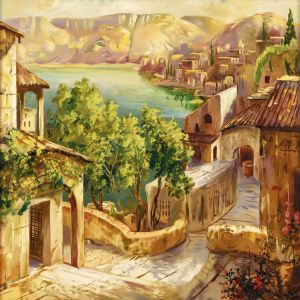Sora-Tar
| Sora-Tar | |
|---|---|
| Image |  |
| Type | Agricultural and Trade City |
| Location | Northern shore of Lake Sora, central Sanctuary Vale |
| Realm | Terasil |
| Region | Sanctuary Vale |
| Subregion | Sora Basin |
| Significance | Primary agricultural and logistical hub of the Vale; multicultural trade city |
| Controlled by | Council of Kar-Thal |
Introduction
Sora-Tar is a diverse agricultural city situated on the northern shore of Lake Sora in the heart of the Sanctuary Vale. It serves as the primary provisioning and trade hub for surrounding settlements and is the only formally recognized city within the region. Positioned near the Va-Djes Road and with river access through the Sora Basin, it is a crucial waypoint for caravans, laborers, and supply routes.
Geography
The city occupies a curved shoreline, with infrastructure rising gradually inland in layered terraces. Dockyards and storage piers cluster near the lake, while agricultural outposts and communal lodges sit along the elevated plains. Irrigation channels drawn from lake runoff support crops across the drier northern expanse, especially toward Alun-Tar.
History
Once a barge depot and traveler’s rest, Sora-Tar expanded as regional agricultural demand rose. Its population swelled with migrants, laborers, and trade groups—especially those seeking independence from the more rigid structures of mountain-based cities.
Districts
- Lower Docks – Lakeside piers and export terminals for grain and water transport.
- Vault Quarter – Granaries and storehouses for dry harvests and essential supplies.
- Eastern Commons – Residential quarters housing mixed guilds, workers, and caravans.
- Market Loop – Central trade circuit with merchant stalls and roaming vendors.
- Southwatch Rise – Administrative terrace with Council registrars and road oversight.
Culture and Society
Sora-Tar’s residents come from varied backgrounds, with laborers, traders, and settlers coexisting across linguistic and cultural lines. Governance is pragmatic and adaptive, with emphasis on logistical clarity and land-use coordination.
Economy
The city supports a broad economy rooted in crop collection, regional resupply, and portable infrastructure. Grain and produce from Alun-Tar and surrounding fields are processed here for distribution. The city also crafts utilitarian tools, wagons, and shelters for mobile groups traveling through the Vale.
Defense and Military
Sora-Tar lacks major defenses but maintains a rotating Stonewarden post. A signal tower provides alerts through the Council relay system. Local security is enforced via trade guild watch groups and caravan oaths.
Dangers and Threats
Challenges include seasonal population strain, irrigation disputes, and water access during dry cycles. While internal violence is rare, factional tensions may surface during resource shortages. Threats from local wildlife persist near outer croplands, especially during planting and harvest seasons.